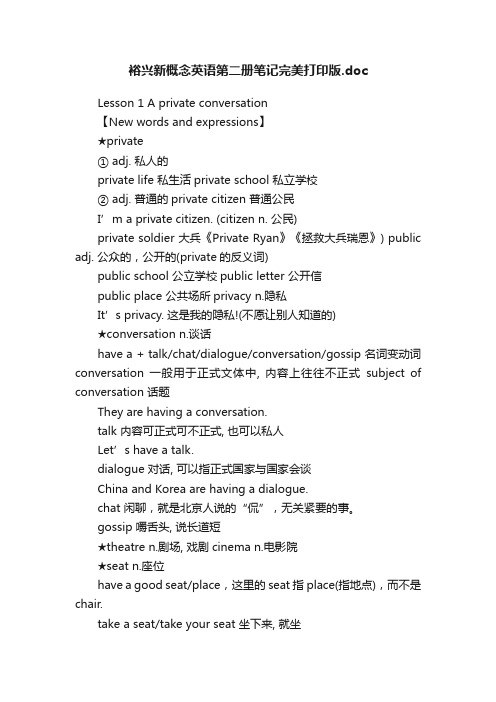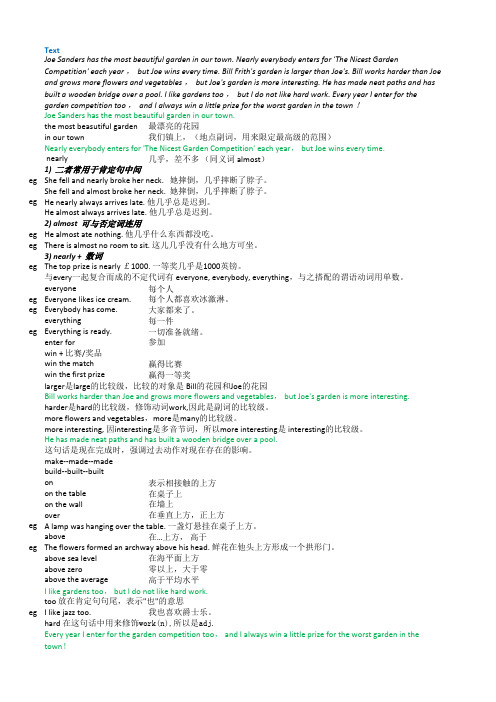新概念英语第二册复习笔记第四课课文讲解.doc
- 格式:doc
- 大小:49.00 KB
- 文档页数:3

裕兴新概念英语第二册笔记完美打印版.docLesson 1 A private conversation【New words and expressions】★private① adj. 私人的private life 私生活private school 私立学校② adj. 普通的private citizen 普通公民I’m a private citizen. (citizen n. 公民)private soldier 大兵《Private Ryan》《拯救大兵瑞恩》) public adj. 公众的,公开的(private的反义词)public school 公立学校public letter 公开信public place 公共场所privacy n.隐私It’s privacy. 这是我的隐私!(不愿让别人知道的)★conversation n.谈话have a + talk/chat/dialogue/conversation/gossip 名词变动词conversation 一般用于正式文体中, 内容上往往不正式subject of conversation 话题They are having a conversation.talk 内容可正式可不正式, 也可以私人Let’s have a talk.dialogue 对话, 可以指正式国家与国家会谈China and Korea are having a dialogue.chat 闲聊,就是北京人说的“侃”,无关紧要的事。
gossip 嚼舌头, 说长道短★theatre n.剧场, 戏剧cinema n.电影院★seat n.座位have a good seat/place,这里的seat指place(指地点),而不是chair.take a seat/take your seat 坐下来, 就坐Is the seat taken? 这个位置有人吗?请坐的3种说法:Sit down, please. (命令性)Take your seat, please.Be seated, please. (更礼貌)作为动词的seat与sit的区别sit(sat,)vi. 就座He is sitting there.他坐在那儿。


TextI have just received a letter from my brother, Tim. He is in Australia. He has been there for six months. Tim is anengineer. He is working for a big firm and he has already visited a great number of different places in Australia. He has just bought an Australian car and has gone to Alice springs, a small town in the centre of Australia. He will soon visit Darwin. From there, he will fly to Perth. My brother has never been abroad before, so he is fending this trip very exciting.I have just received a letter from my brother, Tim.just刚刚(通常搭配现在完成时,常置于助动词和实意动词之间)received a letter from sb= hear from sb 收到…的来信write to sb给…写信He is in Australia. He has been there for six months.Australia n澳大利亚Australian adj澳大利亚的n澳大利亚人eg He went there six months ago.他半年之前去的那里。
eg He has been there since six months ago. 他自从半年前开始就在那儿了。

Text Joe Sanders has the most beautiful garden in our town.the most beasutiful garden 最漂亮的花园in our town 我们镇上,(地点副词,用来限定最高级的范围)Nearly everybody enters for 'The Nicest Garden Competition' each year , but Joe wins every time. nearly 几乎,差不多 (同义词 almost )1) 二者常用于肯定句中间egShe fell and nearly broke her neck. 她摔倒,几乎摔断了脖子。
She fell and almost broke her neck. 她摔倒,几乎摔断了脖子。
egHe nearly always arrives late. 他几乎总是迟到。
He almost always arrives late. 他几乎总是迟到。
2) almost 可与否定词连用egHe almost ate nothing. 他几乎什么东西都没吃。
egThere is almost no room to sit. 这儿几乎没有什么地方可坐。
3) nearly + 数词egThe top prize is nearly £1000. 一等奖几乎是1000英镑。
与every 一起复合而成的不定代词有 everyone, everybody, everything ,与之搭配的谓语动词用单数。
everyone 每个人egEveryone likes ice cream. 每个人都喜欢冰激淋。
egEverybody has come. 大家都来了。
everything 每一件事,每一egEverything is ready. 一切准备就绪。
enter for 参加win + 比赛/奖品win the match 赢得比赛win the first prize 赢得一等奖larger 是large 的比较级,比较的对象是 Bill 的花园和Joe 的花园Bill works harder than Joe and grows more flowers and vegetables , but Joe's garden is more interesting.harder 是hard 的比较级,修饰动词work,因此是副词的比较级。


新概念英语第二册第四课课文详解一、本课生词和短语1、exciting adj. 令人兴奋的excite:激动excited:-ed:自己感到-ing:令人感到exciting boyinteresting manThe man is interesting.The news exciting,I am excited其宾语一定是人The news excited me.让后面的人感到...interesting:令人感到有趣的interested:感到有意思的The book interests me.2、receive v. 接受,收到I have just received a letter from my brother, Tim.我刚刚收到弟弟蒂姆的来信,receive[ri5si:v]vt.收到, 接到, 接收(receive的过去式和过去分词是received)re-前缀,表"又,重新"的意思。
Receive/ accept/和take的区别:accept:同意接收receive:客观的收到take take the exam:接收考试; take advice接收建议This morning I received a bunch of flowers from aboy,but I didn't acceptit.take take the exam:接收考试; take advice接收建议receive/havereceive/have a letter from somebody.3、firm n. 商行,公司Companyfirm 主要用在非正式场合和口语,Company 是公司的正式称呼。
4、abroad adv. 在国外副词,直接和动词连用go aroadlive abroadstudy abroad5、so he is finding this trip very exciting.所以,他觉得这次旅行非常激动人心。
新概念英语第二册(Lesson 4)学习笔记Lesson 4An exciting trip激动人心的旅行Read and then answer the question.读一读,然后回答以下问题。
Why is Tim finding this trip exciting?为什么蒂姆发现这次旅行激动人心?I have just received a letter from my brother, Tim. 我刚刚收到弟弟蒂姆的来信,He is in Australia.他正在澳大利亚。
He has been there for six months.他在那儿已经住了6个月了。
Tim is an engineer.蒂姆是个工程师,He is working for a big firm and he has already visited a great number of different places in Australia.正在为一家大公司工作,并且已经去过澳大利亚的不少地方了。
He has just bought an Australian car and has gone to Alice springs, a small town in the centre of Australia.他刚买了一辆澳大利亚小汽车,现在去了澳大利亚中部的小镇艾利斯斯普林斯。
He will soon visit Darwin.他不久还将到达尔文去,From there, he will fly to Perth.从那里,他再飞往珀斯。
My brother has never been abroad before, so he is finding this trip very exciting.我弟弟以前从未出过国,因此,他觉得这次旅行非常激动人心。
【精讲笔记】△exciting adj.令人兴奋的v.excite 激动adj.excited ,exciting-ed:自己感到;-ing:令人感到如:interesting:令人感到有趣的;interested:感到有意思的动词的宾语一定是人,让后面的人感到……eg:The news excited me.The book interests me.△receive v.接受,收到※3个接受:①accept:同意接收,主观上乐意②receive(与have通用):客观的收到receive/have a letter from sbeg:This morning I received a bunch of flowers from a boy,but I didn't accept it.③take:接受,与前两词无可比性,只需记住两个搭配:take the exam;take advice△firm n.商行,公司等同于company△abroad adv.在国外注意是个副词,直接和动词连用,不需要介词go/live/study abroad△have been+in +地点他已经到北京了:He has arrived in Beijing.他到北京一年了,就不能用arrive了。
TextI love travelling in the country, but I don't like losing my way.I went on an excursion recently, but my trip took melonger than I expected.'I'm going to Woodford Green,' I said to the conductor as I got on the bus, 'but I don't know where it is.''I'll tell you where to get off.' answered the conductor.I sat in the front of the bus to get a good view of the countryside. After some time, the bus stopped. Looking round, I realized with a shock that I was the only passenger left on the bus.'You'll have to get off here,' the conductor said. 'This is as far as we go.''Is this Woodford Green?' I asked.'Oh dear,' said the conductor suddenly. 'I forgot to put you off.''It doesn't matter,' I said. 'I'll get off here.''We're going back now,' said the conductor.Taken for a ride 被当作是乘车兜风take for 把…认为是,把…看成为;take sb for a ride 欺骗某人, 诈骗某人标题相关 1乘车兜风2我被骗了I love travelling in the country, but I don't like losing my way.我喜欢在乡间旅行, 但却不愿意迷路.love to do一次性喜欢like to do一次性喜欢prefer to do一次性喜欢love doing长期性喜欢like doing长期性喜欢prefer doing长期性喜欢love to do 想要做某事love doing 喜欢做enjoy doing 喜欢做eg Love me , love my dog. 爱屋及乌lose one’s way 迷路;lose one’s job 失业lose one’s face 丢脸lose one’s temper 失去控制,发脾气lose weight减肥put on weight 增加体重、加胖lose one’s cool 沉不住气、失控发火keep one’s cool保持镇定lose one’s head 昏了头,冲动keep one’s shirt on 保持冷静;lose one’s life丧命lose one’s breath 喘不过气来,呼吸困难、喘息,上气不接下气lose oneself 沉迷于eg He lost himself in reading . 他沉迷于读书.区别 lose , loose , misslose [lu:z] v丢失;迷失(lost - lost)eg I don’t like losing my way.我不喜欢迷路。
新概念英语第二册:第4课课文详解及语法解析课文详注 Further notes on the text1.He is working for a big firm and he has already visited a great number of different places in Australia. 他正在为一家大公司工作,并且已经去过澳大利亚的很多地方了。
(1) work for… 在……上班/任职表达“上班”这个意思时还能够说work at:She works at a department store.她在一家百货商店上班。
(2)a number of只能接可数名词的复数形式。
通常,number前有great, large, good, small, certain等形容词,数量大小也随之改变:A large/ great number of our students are Danish.我们的学生中有很多是丹麦人。
There are a small number of spelling mistakes in your homework.你的家庭作业里有少数几个拼写错误。
2.He will soon visit Darwin. 他不久还将到达尔文去。
will 表示将来要发生的事。
这句话的时态是一般将来时。
(cf. 第12课语法)下一句话From there, he will fly toPerth也是一般将来时。
3.My brother has never been abroad before, so he is finding this trip very exciting.我弟弟以前从未出过国,所以,他觉得这次旅行非常激动人心。
(1)这句话由两个简单句组成,后一句由连词so引导,为表示结果的状语从句。
(2)find作“发现”、“发觉”讲时宾语往往带补足语(一般为形容词),说明宾语的状况、性质等:I find the film very interesting.我觉得这电影很有趣。
新概念英语第二册复习笔记第四课课文讲解
just搭配现在完成时
receive a letter from sb 相当于hear from sb 收到……来信
write to sb 给••…写信
Australia n.澳大利亚Australian adj.澳大利亚的
Italy n.意大利Italian n.意大利语
for six mon ths
He went there six months ago. 半年前他去那儿了。
He has been there since six months ago.自从半年前他就去哪儿了。
He has been there for six months. 他已经在哪儿半年了。
for + 一段时间
since +时间的一点
engineer n.工程师,建筑师,机械师,火车司机engine n.发动机;引擎,机车,火车头
a steam engine 蒸汽机车
engine-driver (Br)火车司机
engineer (U.S)火车司机
a number of + n.( pl.) + are ...... 许多的,大量的
eg. A large number of books are stolen.大量的书籍被盗。
The number of + n.( pl.) + is ............... 的数量是
eg. The number of stolen books is 25. 被偷的书的数目是25 本。
eg. A number of people apply for this job・许多人中请这份工作。
eg. The number of applicants is 70.申请者的数目是70 人。
number n.号码,数字,数目
eg. My telephone number is 6229897.我的电话号码是6229897.
No. ( short term 缩略形式)
eg. The company is No. One in the oil business.这家公司在石油领域是最棒的。
eg. There is safety in numbers. 人多势众。
bought: buy-bought-bought sell-sold-sold bring-brought-brought
have gone to 去了…… have been to 去过……
eg. where is Jackson? Jachson 去明[5儿了 ?
He has gone to Canada, and he has been there a great number of times・
他去加拿大了,他去过多次。
fly fly-flew-flow n
1)飞,飞行,航行
eg. Birds fly.鸟会飞。
2)飞行器,飞行,航行操纵,乘坐飞行器飞行
fly a kite放风筝
fly a plane驾驶飞机
fly to Paris乘飞机去巴黎
fly the Atlantic飞越大四洋
eg. The children flew to meet their mother.孩子们飞奔去接妈妈。
eg. It's late now. I must fly.天很晚了,我必须抓紧时间。
eg. How time flies!时光飞逝!
fly n.苍蝇
eg. There is a fly in the soup.汤里有只苍蝇。
The bird has flown (警察语)要抓的人跑了。
Pigs might fly.即使有奇迹也不大可能岀现(表示对某事不相信)
eg. Tom gives up smoking?汤姆戒烟了?
Yes, pig might fly!哼,我决不相信!
before
1)prep.在……之前
before lunch 午饭前
before 10 o'clock 在十点钟前
2)conj.在•.…之前
eg. Do it before you forget it.在遗忘之前把事情做了。
3)adv.以前,过去
eg. I've seen the film before.我以前看过这部电影。
eg. He has never been abroad before・他以前从來没有出过国。
find +宾语+补语eg. I find English difficult but interesting.我发现英语很难但很有趣。
eg. I find the room empty.我发现房了是空的。
eg. They find the girl diligent and beautiful.他们发现这女孩既勤奋又漂亮。
现在完成时:
have/has +动词的过去分词
表示过去发生的动作对现在存在的影响;表示从过去一直持续到现在并可能持缪下去的的动作或状态。
表示不确定吋间:already, yet, just, never……
表示一段时间:so far, up til I now, sin ce, for a long time,
in the last few years, these days……
把句子变成现在完成时形式:
The bell is ringing.铃正在响。
The bell has just rung. 铃刚刚响过。
1.He is leaving the house.他正要离开房间。
He has just left the house.他刚刚离开房间。
2.He is having breakfast.他正在吃早饭。
He has just had breakfast.他刚刚吃过早饭。
3.She is writing a letter. 她正在写一封信。
She has just written a letter.他刚刚写完一封信。
4.My sister is turning on the radio.我的姐姐正在打开收音机。
My sister has just turned on the radio.我的姐姐刚刚打开收音机。
5.My mother is making the bed.我妈妈正在铺床。
My mother has just made the bed.我妈妈刚刚铺完床。
6.She is buying a new hat.她正在买一顶新帽子。
She has just bought a new hat.她刚刚买了一顶新帽子。
He is still having breakfast.他仍在吃早饭呢。
He hasn't had breakfast yet.他还没有吃早饭。
把句子变成现在完成吋的否定形式:
1.He is still washing the dishes.
He hasn"t washed the dishes yet.
2.She is still making the beds.
She has n't made the beds yet.
3.He is still combing his hair.
He hasn"t combed his hair yet.
4.She is still sweeping the carpet.
She hasn〃t swept the carpet yet.
5.We are still reading "Macbeth".
We haven't read "Macbeth" yet.
Kve already had lunch.我已经吃过午饭了。
Have you had lumch yet?你吃过午饭了吗?把句子变成现在完成时的疑问形式:already seen the new play at "The Glob〃.
我已经在“环球剧院”看过这部新戏了。
Have you seen the new play at "The Glob"?
2.I've already taken my holidays.我已经修过假了。
Have you taken your holidays yet?
3. I've already read this book.
Have you read this book yet?
4」"ve already done my homework.
Have you done your homework yet?
5. I've already finished my work.
Have you finished your work yet?
Receive and Take:
receive: I have just reveived a letter from my brother, take:拿走
Someone has taken my pen.有人拿走我的钢笔。